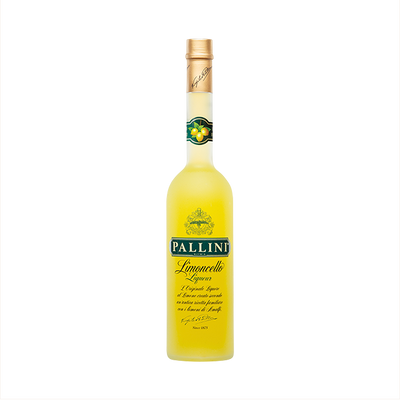Lemon Liqueur
What is Lemon Liqueur?
Lemon liqueur is a vibrant category of Fruit Liqueurs that captures the bright, zesty essence of fresh lemons in a sweetened alcoholic form. These liqueurs are defined by their intense citrus character, typically made by macerating lemon peels, juice, or both in neutral spirits, then sweetening the mixture to balance the natural tartness. The result is a versatile spirit that ranges from crystal-clear varieties like limoncello to cloudy, cream-based versions, all unified by their unmistakable lemon flavor profile.
Learn More About Lemon Liqueur
What makes Lemon Liqueur unique?
Lemon liqueur stands apart from other fruit liqueurs through its perfect balance of bright acidity and natural oils extracted from the citrus peel, creating a complexity that most fruit liqueurs can't match. While berry and stone fruit liqueurs rely primarily on sweetness and concentrated fruit flavors, lemon liqueur brings that essential acidic backbone that makes it incredibly versatile in cocktails—it can brighten heavy spirits, add depth to light ones, or stand beautifully on its own. The production method also sets it apart, as the best lemon liqueurs like limoncello use a cold infusion process that captures those aromatic essential oils without the bitterness, resulting in a liqueur that tastes like liquid sunshine rather than artificial candy.
How is Lemon Liqueur made?
Lemon liqueur starts with fresh lemon peels that get macerated in neutral grain alcohol or vodka for several weeks, allowing the oils and aromatic compounds to infuse into the spirit. After straining out the peels, producers add simple syrup or sugar to balance the tart citrus with sweetness, creating that bright yellow liquid we love. Some distillers take a shortcut by using lemon extract or essential oils, but the best versions stick with real zest for that authentic, vibrant flavor.
How do you drink Lemon Liqueur?
Lemon liqueur shines brightest when served ice-cold as a digestif after dinner, either neat in small glasses or over ice with a twist of fresh lemon peel. While some folks enjoy it as a chilled shot, it really comes alive in cocktails where its bright citrus notes can play supporting roles in everything from refreshing spritzes and Collins-style drinks to creamy dessert cocktails and classic sours. The sunny, zesty character of lemon liqueur makes it perfect for warm weather sipping and spring celebrations, though it also adds a welcome burst of brightness to winter cocktails when you're craving something that tastes like sunshine in a glass.
How do I choose good Lemon Liqueur?
When selecting a lemon liqueur, consider whether you want natural lemon flavor or something more candy-like – Italian brands like Pallini Limoncello offer authentic citrus oils and zest, while commercial options tend toward artificial sweetness. Your cocktail choice should guide your decision: creamy, sweet liqueurs work beautifully in dessert drinks and simple sippers, but if you're mixing into tart cocktails or balancing bitter ingredients, opt for a drier style with more pronounced lemon oil character. Always taste before buying when possible, since the sugar content and intensity can vary dramatically between producers.
Nutritional Information
Typical Calorie Range per Ounce: 80-110 calories
Typical Carbohydrate Range per Ounce: 8-12 grams
Typical Sugar Range per Ounce: 7-11 grams
Typically Gluten Free: Yes
Most lemon liqueurs are naturally gluten-free since they're distilled from neutral spirits and infused with lemon peels, oils, and sugar. The distillation process removes gluten proteins even when starting with grain-based spirits. That said, some producers may add flavorings or use production methods that could introduce gluten. Always check the specific product label and manufacturer information to confirm gluten-free status, especially if you have celiac disease or severe gluten sensitivity.
Scrolled this far? Your reward? Lemon Liqueur Trivia!
- The famous Italian limoncello gets its intense yellow color not from artificial dyes, but from the essential oils in lemon zest that contain natural compounds called limonenes. These same oils are so potent that traditional producers in Sorrento and the Amalfi Coast use only the outermost layer of peel, avoiding the bitter white pith completely. The result? That sunshine-bright hue comes straight from nature's chemistry lab.
- French monks at the Abbey of Fécamp accidentally created one of the world's first lemon liqueurs in the 1600s while trying to make medicine. They were steeping lemon peels in neutral spirits to extract healing properties, but discovered their "medicinal tonic" tasted so good that local nobles started requesting it for dinner parties instead of the infirmary.
- Authentic limoncello must be served at exactly -10°C (14°F) to achieve its signature syrupy consistency. At this temperature, the high sugar content creates a viscous texture that coats your mouth, while the alcohol prevents it from actually freezing. Serve it too warm and it becomes thin and harsh; too cold and the flavors mute completely.
- The Sfusato Amalfitano lemons used in premium limoncello are so prized that they're protected by European law and can only be grown on terraced gardens carved into cliffsides along Italy's Amalfi Coast. These lemons grow larger than regular varieties, with skins so thick and oil-rich that locals joke you can smell them from three terraces away.
- Polish Cytrynówka, made by infusing whole lemons in vodka for months, turns completely clear despite using entire yellow fruits. The extended maceration process breaks down the pigments while preserving all the citrus oils, creating a crystal-clear spirit that tastes intensely lemony but looks like water. Polish families guard their specific recipes like state secrets, with some versions taking up to six months to properly mature.
Higher-proof spirits can be intense. Mix carefully, taste thoughtfully, and enjoy responsibly.
Gift message (optional)

